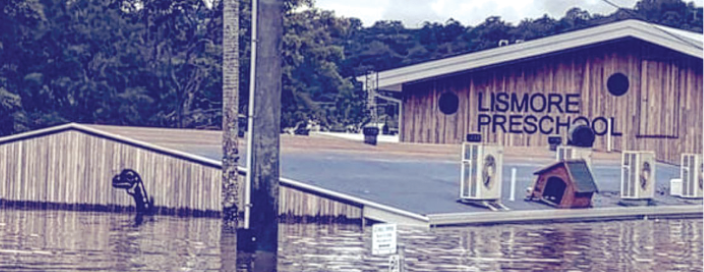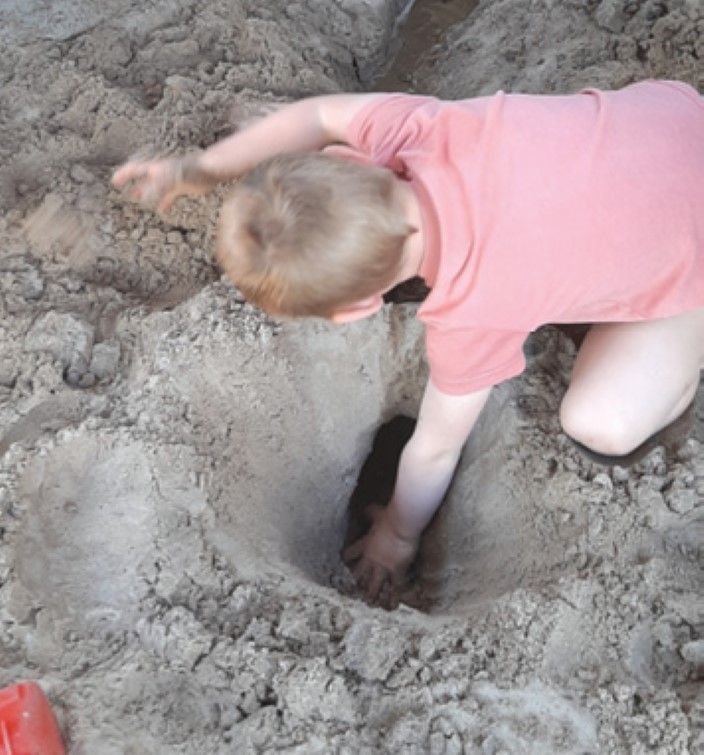Unity in the face of adversity has been key to dealing with the flooding which devastated the northern rivers area of NSW in late February, Sue Osborne writes.
Local preschools and early childhood education and care centres from communities all over Australia, as well as the broader community, banded together to help those hit by flooding.
In April, thanks to pressure from the Northern Rivers Preschool Alliance, supported by the NSW/ACT IEU Branch, NSW Education Minister Sarah Mitchell announced additional funding for flood affected early education services.
The Northern Rivers Preschool Alliance, coordinated by Clunes Preschool Director and IEU Early Childhood Services Council member Melinda Gambley, set up a GoFundMe page appealing for financial support for rebuilding and replacement of lost equipment and resources.
The Alliance is a not-for-profit organisation representing 42 state-funded preschools on the far north coast, from Grafton in the south, Tweed in the north and west to Tabulam.
“We knew the first flood was coming, I’d already made the decision to close our preschool as I knew most of my staff would be flooded out – but we had no indication of the scale of what was to come,” Melinda said.
“I had been up early checking the river heights and could see it was going to be big – I contacted my staff and friends who lived in low lying areas to see if they were okay.
“It was truly shocking to see (in real time thanks to social media) the cries for help from people and the emergency services overwhelmed and unable to assist.
“I’ve lived here for over 25 years now, so I knew that several of our Lismore preschools would be seriously damaged and that the downstream communities of Coraki, Ballina and Woodburn would be next.
“Not only that, many educators, staff and families would have lost their own homes.
“The early childhood community here in the northern rivers is close; we have a strong network of preschools through the Northern Rivers Preschool Alliance and a long history of collaborating and advocating for each other.
“I was in the fortunate position that both my home and preschool were unaffected, but these people are my long-time colleagues and friends, I’ve worked in some of the preschools, and I know a lot of the communities and families.
“I contacted Kate Scanlan, the Director of Dunoon Preschool and Alliance President. We were both desperate to do something. We got our heads together and set up the GoFundMe and, with the support of the Alliance and the team at Koori Curriculum, began to manage this and some other practical support for preschools and local children.
“Around the same time, I wrote to Education Minister Sarah Mitchell, asI could see the impact was going tobe huge.
“The wheels in the Department turn excruciatingly slowly and it took several weeks to get any action; preschool directors, staff and families were left to manage the absolute devastation themselves.
“The toll on these people was, and continues to be, huge. On top of the challenges of the past two years, they are just about at breaking point, and they somehow struggle on.
“The recovery of our preschools will be slow and long. There is no one here who is untouched by these events; the devastation is widespread and ongoing, and we are already seeing the heartbreaking impacts of homelessness and trauma on our children and our educators.
“While the Minister has visited several times and has announced some funding and support, it’s not enough. While the initial counselling supports are great, they are short-term and need to be extended beyond the end of April.
“We’ve been so grateful for the support of our fellow educators and centres around NSW, but I just really hope the teachers, educators and children are not forgotten by the government and the people of NSW.”
The IEU wrote to Mitchell in late March to support the Alliance’s pleas. The letter said in part:
“These teachers have been actively involved in securing assistance for the clean-up, repair and relocation of their services so they can continue to provide quality education and care.
“The families rely on the preschools to provide care for their children while they attempt to rebuild their lives. The children need the security and routine from their trusted educators to enable them to recover from the trauma of this disaster in a caring, familiar environment.
“The IEU urges you as Minister and your department to urgently direct adequate resources to support these teachers and their colleagues to rebuild their early education services. Currently these services are relying on volunteers for cleaning and donations of resources to enable them to operate.
“The union is concerned about the ongoing effect this disaster will have on these teachers, particularly regarding burnout and fatigue which will exacerbate the current teacher shortages. We believe that teachers should have access to funded counselling, if they request it, to be able to continue to perform their jobs in this difficult situation.”
On 5 April, Mitchell announced a package including $9.5 million for psychology and counselling for school and early childhood staff and trauma training so they can support students, and $9 million to help ECEC services rebuild.












































































































































